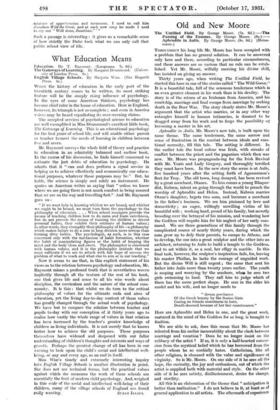What Education Means Education. By T. Raymont. (Longmans. 7s. 6d.)
The Gateways of Learning. By Margaret Drummond. (Univer- sity of London Press. 6s.) WHEN the history of education in the early part of the
twentieth century comes to be written, its most striking feature will be the steeply rising influence of psychology.
In the eyes of some American thinkers, psychology has become chief ruler in the house of education. Here in England, however, its triumph is not so complete ; and even in America voices may be heard repudiating its over-weening claims.
The accepted services of psychological science to education are well exemplified in Miss Drummond's excellent little book, The Gateways of Learning. This is an educational psychology
for the first years of school life, and will enable either parent or teacher to meet the needs of learning in children between five and seven.
Mr. Raymont surveys the whole field of theory and practice in education in an admirably balanced and mellow book. In the course of his discussion, he finds himself concerned to estimate the just debts of education to psychology. He admits that it " can and does perform a signal service in helping us to achieve effectively and economically our educa- tional purposes, whatever those purposes may be." But, he holds, the science is simply and solely an instrument. He quotes an American writer as saying that " unless we know where we are going there is not much comfort in being assured that we are on the way and travelling fast." And Mr. Raymont goes on :
" If we want help in knowing whither we are bound, and whither we ought to be bound, we must turn from the psychology to the philosophy of education. . . . When school managers provide the means of teaching children how to do sums and learn catechic.ns, but do not provide the means of training the children in decent personal habits, they exhibit their estimate of human values ; in other words, they exemplify their philosophy of life—a philosophy which makes failure to do a sum in long division more serious than forming dirty habits. The psychologist, as such, is in this case concerned only with the mechanism of habit formation, whether the habit of manipulating figures or the habit of keeping the mind and the body clean and sweet. The philosopher is concerned with human values, and it is the philosophic attitude that we must cultivate if we are to attack with fair hope of success the problem of what to teach and what else to aim at in our teaching."
Now it seems to me that, in this explicit statement of his
views as to the relation between psychology and education, Mr. Raymont misses a profound truth that is nevertheless woven implicitly through all the texture of the rest of his book, one that gives life and sense to all his wise words about discipline, the curriculum and the nature of the school com-
munity. It is this : that whilst we do turn to the critical philosophy of values for the ultimate ends and aims of education, yet the living day-to-day content of those values has greatly changed through the actual work of psychology. We have but to compare the relation between teacher and pupils to-day with our conception of it thirty years ago to realise how vastly the whole range of values in that relation has been increased by the teacher's greater knowledge of children as living individuals. It is not merely that he knows better how to achieve the old purposes. Those purposes .themselves have widened and deepened with our fuller understanding of children's thoughts and interests and ways of growth. Perhaps the greatest change of all has been in our earning to look upon the child's social and intellectual well-
being, at any and every age, as an end in itself.
Miss Wise's timely and extremely interesting inquiry
into English Village Schools is another illustration in point. She does not use technical terms, but the practical values against which she measures the work of these schools are essentially the fruit of modern child psychology. And, weighed in this scale of the social and intellectual well-being of their children, many of the village schools of England are found






































 Previous page
Previous page